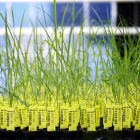United Kingdom
June 21, 2012
Source: Parliamentary Office of Science and Technology (POST)
 This policy brief, published by the UK's Parliamentary Office of Science and Technology (POST), examines the potential benefits and challenges of using genetically modified (GM) crops for agricultural development in the developing world, and highlights policy approaches that could support a positive contribution to food security.
This policy brief, published by the UK's Parliamentary Office of Science and Technology (POST), examines the potential benefits and challenges of using genetically modified (GM) crops for agricultural development in the developing world, and highlights policy approaches that could support a positive contribution to food security.
With the majority of the workforce in developing countries involved in agriculture, strengthening this sector could go a long way to meeting future food needs. Genetic modification could play an important part in this, says the brief, by improving crop resistance to pests, herbicides, and extreme climatic or environmental conditions. But there is concern over potential risks to the environment and health.
GM crops are only currently grown in a handful of developing nations. A major challenge is building trust in regulation and confidence in the safety of GM crops. This can be achieved through engaging stakeholders and adopting a precautionary approach to avoid overly simplistic assessments of risk.
Regulatory frameworks should consider trade issues, says the brief. The ability of, for example, African countries to adopt GM crops is in part dependent on whether they can export to European markets, where GM is often not tolerated. Import policies contend with different obstacles, such as keeping GM and regular crops separate in storage and supply chains.
Although private funding for GM research is substantial, subsistence crops grown by farmers in poor countries have limited commercial opportunities. Developing new crops suited to developing countries will require public sector funding, as well as fostering research collaborations and private-public partnerships.
Smallholders have been slow to adopt GM crops despite their potential to improve yields. This brief stresses the need for access to unbiased information, and for allowing farmers to save GM seed to replant in subsequent years. Saved seed is a major resource for smallholders, but many commercial GM varieties must be bought afresh each year.
The potential risks of GM and the diversity of agricultural systems in the developing world mean that technical, ecological, economic and social assessments must be carried out before adopting any GM crop.
The brief concludes that GM is only one dimension of agricultural development — successful in specific cases against specific problems. It stresses that GM crops must be used in conjunction with other agricultural development strategies such as increasing access to irrigation and enhancing soil quality.
Link to full policy brief from the Parliamentary Office of Science and Technology
This policy brief was written by Chandrika Nath, Deputy Head of Physical Sciences & ICT and Science and the Developing World, and Jonathan Wentworth, Scientific Advisor on Environment and Energy, at the Parliamentary Office of Science and Technology, London, UK.
Photo: Flickr / BASF – The Chemical Company